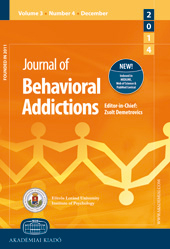Workaholism: An overview and current status of the research
Workaholism: An overview and current status of the research
Author(s): Cecilie Schou AndreassenSubject(s): Psychology, Behaviorism, Health and medicine and law, Socio-Economic Research
Published by: Akadémiai Kiadó
Keywords: antecedents; intervention; measurement; prevalence; outcomes; workaholism;
Summary/Abstract: This article addresses the stable tendency of excessive and compulsive working (i.e., workaholism). The main aim is to provide an updated oversight of the research area related to definition, prevalence, assessment, causes, outcomes, intervention as well as proposed future research directions. The target-population is both researchers and clinicians. Methods: The findings are identified by narratively reviewing the literature. Results: Research into workaholism has expanded over the last two decades. Several screening instruments to identify workaholics have been developed. The vast majority of these are based on seemingly atheoretical foundations, lacking convergent validity with each other and with related constructs. Research generally shows that workaholism is related to impaired health and well-being as well as to conflicts between work and family life. Workaholism is probably caused and maintained by a range of factors, although solid empirical underpinnings for suggested antecedents are currently sparse. So far no well-evaluated interventions for workaholism exist. Conclusions: At present, workaholism as a construct lacks conceptual and empirical clarity. Future research efforts should prioritize longitudinal studies as well as studies incorporating unbiased, firm parameters of both health and behavior.
Journal: Journal of Behavioral Addictions
- Issue Year: 3/2014
- Issue No: 1
- Page Range: 1-11
- Page Count: 11
- Language: English

